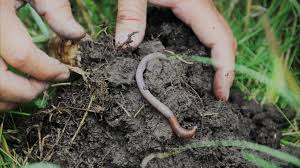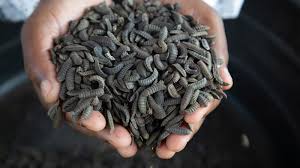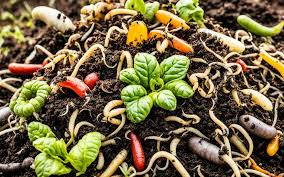![]()
If you’ve landed on this article page, you’re probably searching for a
good business idea—an idea that’s light on the pocket but heavy on
returns, promising both a fulfilling journey and potential profit.
|
How To Start A Worm Farm as a Business
in Nigeria
Commercial worm farming is the large-scale cultivation of worms
for the production of vermicompost and live worms for use in
agriculture, gardening, and fishing. Unlike hobbyist operations,
commercial worm farms operate as full-blown businesses, focusing
on mass production with millions of earthworms to meet the
demands of various customers and markets. These farms utilize
extensive setups with large worm bins or beds, employing
systematic feeding, breeding, and harvesting methods to ensure
high productivity and product quality.
A worm farm is an enclosed area of organic matter, worms, and
bedding. Worms feast on the organic matter and convert it into
worm castings, which is nothing but vermicompost. When mixed
with soil, this vermicompost enhances its nutrient value.
Starting a worm farm is the perfect option. The good news is,
when pursuing it as a hobby, you can use the vermicompost for
your lawn and garden. Once you convert it into a business, you
can sell vermicompost and various by-products.
Low barrier to entry
Another reason to start a worm farm is that it's a low-cost
business. The barrier to entry is pretty low . When pursuing a
hobby or a small business, it's not wise to sink a lot of money
into it. A worm farm qualifies under this criteria as well.
Shortlist a location
The very first thing a worm farmer needs to do is shortlist a
location for the worm bin. Anyone who doesn't mind hosting worms
on the same premises can place worm bins in the basement. Since
basements don't get much sunlight and are usually cooler, they
are the perfect place to start a worm farm.
Worms need a temperature between 40°F and 75°F and ample
moisture in the surrounding environment. It's not that difficult
to fulfill both these conditions in the basement.
Create the bedding: Now that you have the equipment, location,
and worm bin ready, you need to start preparing the bedding.
Bedding is where worms spend most of their time. It is also
where they lay most of the worm castings. In a nutshell, it's
important to prepare the bed correctly. The materials you can
use for this purpose include: Shredded paper, Shredded
cardboard, Peat moss, Coconut coir
Aged compost
Ideally, you should create a mixture of these bedding materials
and spread it around in the worm bin. According to The
University of Vermont, it's a good idea to ensure the bedding is
at least 6 inches thick. After spreading out the bedding,
sprinkle water over it to make it moist.
You might be thinking, how much water to sprinkle?
The bedding should have the texture of a wet sponge. So,
sprinkle water accordingly. If you notice any standing water in
the bedding, you can always add more bedding to absorb it.
Select the worms
Now is the time to add worms to the bin. If you are confused
between the worm species, the two best options include:
Red wigglers
Red wigglers are the most common species of vermicomposting
worms. Reasons why they are better than other species include:
they can consume organic matter equal to their body weight
daily.
Red wigglers can consume a wide variety of organic matter. They
are tougher than other vermicomposting worms.
Since they reproduce quickly, the production rate of
vermicomposting increases exponentially. Since they like to live
in colonies, you can maintain high worm density.
A Typical Day in the Worm Farm Business
On an administrative level, a typical day in the worm farm
business will revolve around you answering a lot of questions
about your worms from prospective customers, setting up
shipments, and providing customer support. If it’s harvest day,
then you’ll have to go out and harvest your worms early in the
morning. Once a week, you’ll need to turn the bedding material
over with a pitchfork and check on the worms’ conditions. Make
sure you feed your worms and collect any organic waste that’s
been produced.
Let’s say you have a good source of organic material (food
scraps) you can use to feed all the worms. In a month, your
2,000 worms will produce about 666 pounds of worm castings per
month. That’s worth about $2,000. And they’ll also be using that
warm, dark, dry ambiance to produce more worms. In the bedding,
you’ll see small oval balls, which are worm eggs. Each egg
should hold several worms.
If you're wondering about when you can start selling the
vermicompost, you'll have to wait for 6 to 8 months, before you
generate enough compost to start selling it.
Basic biology knowledge
It's a good idea to learn about worms before starting a worm
farm. To gain the essential knowledge, read a few blogs like
this one.
Attention to detail
While maintaining a worm farm, you must pay attention to the
smaller details. Doing so will help you spot problems ahead of
time and ensure your worms and worm farming business thrive.
How profitable is a worm farm?
An efficiently run worm farm can generate 40% profit margins. Of
Course as the farm grows, the margin can go even higher, but
when commencing worm farming for profit the margins are usually
half of the above mentioned number.
Is worm farming profitable?
Yes, worm farming is profitable as along with vermicompost, you
can breed and sell worms. This further boosts the profit margin.
Do worm farms smell?
A well-maintained worm farm doesn't smell. It just has an earthy
fragrance. In fact, if your worm farm emits a foul odor, it
usually indicates trouble.
Who buys worms from worm farms?
Gardeners, fishermen, and farmers buy worms from worm farms.
Anyone looking to enrich the soil, use them as bait, or start
their own worm farm purchases worms from worm farms.
$2,000 (cost for 100,000 compost worms)
$500 (cost for 50 bins to keep the worms in)
$500 (cost for miscellaneous tools you’ll need)
$1000 (monthly cost of 15 hours per week of labor at $15/hour)
The worms will need food and water, and those will be ongoing
weekly costs so it’s important to have a plan for those. Look
for free options in your area, either manure or food waste you
can compost on site.
And as your populations and operation grows to millions of
worms, you will need:
Forklift ($5,000-$15000)
Tractor ($4,000-$15000)
Warehouse or covered space ($2,000-$25,000)
And finally, if you decide you want to produce worm castings you
may need a continuous flow through (CFT) reactor which will cost
anywhere from $2,000 to $40,000.
Quick Guide to Worm Farming
Get our Practical Training Guide on worm production. Worm
farming for beginners is not that difficult if you first gain
the essential knowledge and are willing to put in the work. Our
in house expert are ready to walk you through the Production
Processes. This guide is crafted for worm farming enthusiasts
ready to expand their at-home operation, and hopefully, their
income! This guide
provides a step-by-step approach to starting your own worm farm,
covering everything from initial considerations and planning to
marketing your products and ensuring you're well-equipped to
turn your green thumb into a green enterprise!
|







